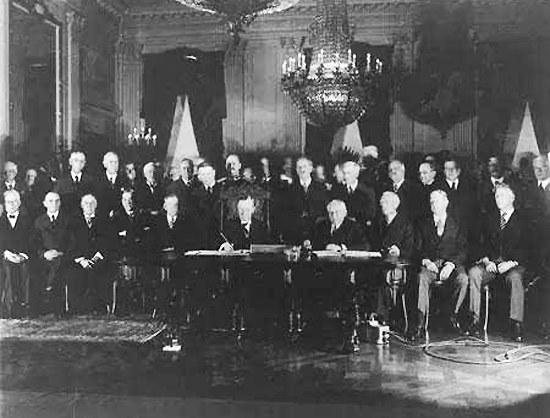Segment 27a, introduction.
27段第一部分,內容介紹
This highly exciting lecture traces the development of American foreign policy,
本次課追溯了美國從一戰開始到二戰結束的期間外交政策的發展
with a little domestic policy thrown in, from the beginning of World War I to the end of World War II.
也涉及了一點國內政策
Although victory in World War I promised a safer world for all involved, the reality was rather different.
盡管美國在一戰中的勝利向人們許諾了一個更安全的世界,現實卻并非如此
The dawn of World War II found the US still reeling from the Great Depression and none to eager for foreign entanglements.
二戰開始的時候,美國才剛剛從經濟大蕭條中走出來,不太想卷入外國瓜葛
Especially foreign entanglements involving Germany or Japan.
尤其是涉及到德國或者日本這樣的外國政治糾紛

In segment 27b "Safe for Democracy", We take up World War I,
27段第二部分,民主的安全,這一節中我們講探討一戰
the conflict which, according to Woodrow Wilson, would make the world safe for democracy.
據伍德羅·威爾遜稱,一戰將會讓民主更安全
The United States had done its best to stay out of the war, but German aggression ultimately forced the United States in.
美國極盡所能遠離戰爭,但是德國的挑釁行為最終迫使美國參戰
The Americans played a key role in the allied victory and they hoped to bring along a moderate peace among the line of Wilson's 14 points.
美國在同盟國的獲勝中起到了關鍵作用,他們也希望根據威爾遜的十四點和平原則帶來穩健的和平
Yet the Allies and the American Congress alike rejected Wilson's 14 points initiative, with disastrous results.
然而同盟國和美國國會都拒絕了威爾遜的十四點和平原則提議,也招致了災難性的后果
Because of the harsh 1919 Treaty of Versailles, Germany was punished too heavily and Japan was left effectively out in the cold.
1919年的《凡爾賽條約》中,德國得到了嚴懲,日本受到冷落
Soviet Russia was ignored. All of this would cause later consequences.
蘇維埃俄國也被忽視。這些都導致了嚴重的后果











